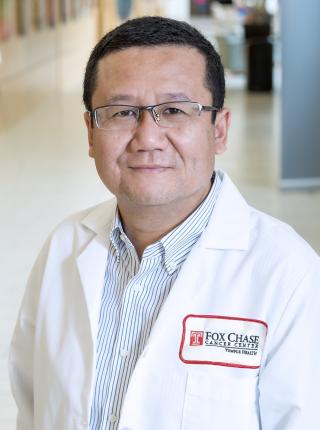Related Articles
00 / 00

Assistant Professor
Member, Cancer Epigenetics Institute
Liu Lab: The mechanisms that fold and regulate the genome
1. Molecular basis of genome folding, function and regulation
2. Interplays between genome folding and epigenetic modifications
3. 3D nuclear dynamics in cancer
At the Liu Lab, our focus is on advancing our understanding of the mechanistic aspects of the human 3D genome and its implications in cancer. Through a combination of biochemical, molecular, and cell biology techniques, along with state-of-the-art genomic and computational analyses, we aim to address three fundamental questions:
1. How do cancer-associated mutations in architectural proteins impact genome folding and function?
2. How does the genome folding machinery process epigenetic codes?
3. What is the biological and clinical relevance of 3D genome folding?
Mechanistic Studies of Genome ArchitectureMechanistic Studies of Genome Architecture
1. Liu Y and Dekker J. CTCF-CTCF loops and intra-TAD interactions show differential dependence on cohesin ring integrity. Nature Cell Biology, 2022, 24:1516-1527.
2. Hildebrand EM, Polovnikov K, Dekker B, Liu Y, Lafontaine DL, Fox AN, Li Y, Venev SV, Mirny L and Dekker J. Chromosome decompaction and cohesin direct Topoisomerase II activity to establish and maintain an unentangled interphase genome. Cell, in revision, 2022.
BioRxiv (https://doi.org/10.1101/2022.10.15.511838).
3. Tavares-Cadete F*, Norouzi D*, Dekker B, Liu Y and Dekker J. Multi-contact 3C data reveal that the human genome is largely unentangled. Nature Structural & Molecular Biology, 2020, 12: 1105-1114. *Co-first.
4. Oomen ME, Hansen A, Liu Y, Darzacq X and Dekker J. CTCF sites display cell cycle dependent dynamics in factor binding and nucleosome positioning. Genome Research, 2019, 29: 236-249.
5. Oudelaar AM, Davies JOJ, Hanssen LLP, Telenius JM, Schwessinger R, Liu Y, Brown JM, Downes DJ, Chiariello AM, Bianco S, Nicodemi M, Buckle VJ, Dekker J, Higgs DR, and Hughes JR. Single-allele chromatin interactions identify regulatory hubs in dynamic compartmentalized domains. Nature Genetics, 2018, 50:1744-1751.
Genome Folding and Human Diseases
6. Zhang BN*, Liu Y*, Yang Q, Leung PY, Wang C, Wong TCB, Tham CC, Chan SO, Pang CP, Chen LJ, Dekker J, Zhao H and Chu WK. rad21 is involved in corneal stroma development by regulating neural crest migration. 2020. International Journal of Molecular Sciences, 2020. 21(20), 7807. *Co-first.
7. Viny AD, Bowman RL, Liu Y, Durham B, Eisman S, Navitski A, Witkin M, Baslan T, Lowe S, Ott CJ, Dekker J, Koche R and Levine RL. Cohesin members Stag1 and Stag2 display distinct roles in chromatin accessibility and topological control of HSC self-renewal and differentiation. Cell Stem Cell, 2019, 25: 682-696
8. Zhang BN*, Chan TCY*, Tam POS, Liu Y, Pang CP, Jhanji V, Chen LJ and Chu WK. A cohesin subunit variant identified from a peripheral sclerocornea pedigree. Disease Markers, 2019, 8781524. *Co-first.
Transcriptome Dynamics and Regulation in Human Diseases and Evolution
9. Liu Y, Noon A, Aguiar Cabeza E, Shen J, Cynthia Kuk C, Ilczynski C, Huang K, Ni R, Balram S, Chan K, Barbosa-Morais NL, Hermanns T, Blencowe BJ, Azad A, van der Kwast TH, Zlotta AR, and Wrana JL. Next-generation RNA sequencing of Archival Formalin-fixed Paraffin-embedded Urothelial Bladder Cancer. European Urology, 2014 Dec, 66(6):982-986.
10. Li JJ*, Liu Y*, Xin XF, Kim TH, Aguiar Cabeza E, Ren J, Wrana JL, and Zhang Z. Evidence for positive selection on a number of microRNA regulatory interactions during recent human evolution. PLoS Genetics, 2012 Mar, 8:e1002578. *Co-first.
11. Gregorieff A, Liu Y, Inanlou MR, Khomchuk, Y, and Wrana JL. Yap dependent reprogramming of Lgr5+ stem cells drives intestinal regeneration and cancer. Nature, 2015, Oct, 526: 715-718.
12. Golipour A*, David L*, Liu Y, Jayakumaran G, Hirsch CL, Trcka D, Wrana JL. A late transition in somatic cell reprogramming requires regulators distinct from the pluripotency network. Cell Stem Cell, 2012 Dec, 11(6):769-82. *Co-first.
13. Campbell JE, Ussher JR, Mulvihill EE, Kolic J, Baggio LL, Cao X, Liu Y, Lamont BJ, Morii T, Streutker C, Tamarina N, Philipson LH, Wrana JL, MacDonald PE and Drucker DJ. TCF1 links GIPR signaling to the control of beta cell function and survival. Nature Medicine, 2016, Jan, 22: 84-90.
14. Ma F, Arai S, Wang K, Calagua C, Yuan A, Poluben L, Gu Z, Russo JW, Einstein DJ, Ye H, He MX, Liu Y, Allen EV, Sowalsky AG, Bhasin MK, Yuan X and Balk SP. Autocrine Wntless-dependent Wnt signaling drives distinct pathways in primary and metastatic castration-resistant prostate cancer. Cancer Research, 2022, 82(8): 1518-1533.
15. Zheng S, Xiao L, Liu Y, Wang Y, Cheng L, Zhang J, Yan N, Chen D. DZNep inhibits H3K27me3 deposition and delays retinal degeneration in the rd1 mice. Cell Death and Disease, 2018, 9:310.
16. El Hassan MA*, Huang K*, Eswara MBK*, Zhao M, Song L, Yu T, Liu Y, Liu CJ, McCurdy S, Ma A, Wither J, Jin J, Zacksenhaus E, Wrana JL, and Bremner R. Cancer cells hijack PRC2 to modify multiple immune pathways. PLoS ONE, 2015 Jun, 10(6): e0126466. *Co-first.
Mechanistic Studies of Electron Transfer and Proton Pumping
17. Liu Y, and Hill BC. Formamide probes a role for water in the catalytic cycle of cytochrome c oxidase. Biochim Biophys Acta, 2007 Jan, 1767 (1): 45-55.